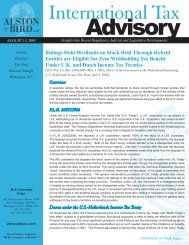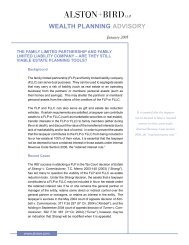SALES & USE TAX PLANNINGNovember 8-9Embassy Suites DallasDallas, TXNovember 15-16Hotel IntercontinentalChicago, ILDecember 6-7Doubletree HotelWashington, DCn An intensive two-day immersion into the concepts, problems and planning opportunities involved with sales, use and gross receipts taxes.This course is designed for the beginner to intermediate level practitioner; however, even the most experienced state tax professional willobtain practical ideas and valuable information concerning the latest administrative, judicial and legislative developments in sales and usetaxation. Delivery Method: Group-Live. No prerequisites or advance preparation required. Estimated continuing education credit: 16 basedon a 50-minute hour, including 1 hour for ethics; 13.33 based on a 60-minute hour, including 1 hour for ethics.Fundamental Concepts and theStreamlined Sales Tax ProjectSales, use, gross receipts taxes – their similarities anddifferences. Determining whether the tax is imposed on thepurchaser or seller. Taxation of services, tangible personalproperty, contractors, corporate and partnership transactions.Sales and use taxes on the local level. The administrativeaspect: licenses, permits, collection fees, exemption certificates,filing requirements. The effect of the Streamlined SalesTax Project on promoting sales and use tax compliance anduniformity between the jurisdictions. Recent developments.Jurisdiction, Nexus and the InternetCoping with increased sales tax collection and use taxremittance requirements. Impact of in-state order acceptanceversus telephone, direct mail or Internet solicitation, dropshipments, distribution from out-of-state, delivery in companytrucks, warehousing, national versus local advertising,collection, financing, other service activities. Destination andtitle passage issues. Economic, physical, electronic presenceand their tax consequences. How to respond to nexusquestionnaires. Recent administrative, court and legislativedevelopments.Taxation of Services, Software, Leasesand Other Special TransactionsApplication of sales and use taxes to the various forms ofcomputer software — canned, custom, electronic, load-andleave;pure services and mixed transactions; installation andfabrication labor; repairs and warranties; leases, short-termrentals, installment sales, sale/leasebacks, leases with anoperator; sales of assets in mergers, acquisitions, liquidationsor corporate reorganizations; sales to government, exemptand charitable organizations; construction contractors.Supporting the exemptions — problems of proof. Planningand refund opportunities.ProblemsPractical application of the concepts presented.Determining the Taxable BaseThe inclusion or exclusion of specific items in determiningthe gross proceeds or sales upon which the tax is based.Treatment of cash and trade discounts, coupons, rebates,returns and allowances, transportation expenses, trade-ins,finance charges, repossessed property, bad debts and taxespaid to other jurisdictions. Impact of the sep arately statedrule on the taxability of gross receipts and how transactionsmay be structured to minimize the im position of tax.Hot Topics in Sales and Use TaxationThe latest administrative, court and legislative developmentson various hot topics in sales and use taxation suchas: qualifying for the manufacturing and sale for resaleexemptions; how states are taxing intercompany, Internet,telecommunication, advertising and other services; sourcingissues in multijurisdictional transactions on the state andlocal level; procedural limitations on refunds and assessments;and more, with a focus on the planning and refundopportunities arising therefrom.Ethics and Managing the Sales and Use Tax FunctionStructuring the sales and use tax function to maximizeeffectiveness while complying with personal ethical standardsand those set by the AICPA, ABA, local state CPA societiesand bar associations. Organizing and maintaining electronicrecords that can be trusted. Motivating and training staff toapply sales and use tax laws correctly to both purchases andsales. Cost saving strategies. Using computer software programsto manage exemption certificates and file sales anduse tax returns.Preparing for Audits and LitigationHow to handle a sales or use tax audit, from the arrivalof the audit notice to the post-audit review. Ethical considerations.Statistical samplings – their benefits and burdens.Analyzing whether to protest an assessment to the administrative,trial and appellate levels. Working effectively withoutside counsel.REGISTRATIONThe registration fee is $825 for the two-day conference and includes continental breakfast, refreshments, specially-prepared seminar materials,and a cocktail reception the first evening of the program. A $30 discount is available if payment accompanies the registration form and is receivedby Interstate Tax Corporation no later than four weeks before a conference date (October 11-TX, October 18-IL, November 8-DC). See page 6for participating speakers, hotel/airfare/car rental discounts and other details, page 8 to register, or call (203) 854-0704 for further information.– 4 –
INTER<strong>STATE</strong> TAX PLANNINGNovember 10-12Embassy Suites DallasDallas, TXNovember 17-19Hotel IntercontinentalChicago, ILDecember 8-10Doubletree HotelWashington, DCn An intensive three-day immersion into the concepts, problems and planning opportunities involved primarily with state income taxation ofmultistate business. This course is designed for the beginner to intermediate level practitioner; however, even the most experienced state taxprofessional will obtain practical ideas and valuable information concerning the latest administrative, judicial and legislative developments ininterstate taxation. Delivery Method: Group-Live. No advance preparation required. Estimated continuing education credit: 24.5 based on a50 minute hour, including 1 hour for ethics; 20.58 based on a 60 minute hour, including 1 hour for ethics.Jurisdiction and NexusConstitutional limitations on state powers to tax interstatebusiness. Protected solicitation and de minimis activities underPublic Law 86-272. Attributional nexus. Consequences of sellingover the Internet, through employees or independent contractors,advertising, delivering, owning or leasing property ina state, other issues. Dealing effectively with nexus questionnaires.The applicable standard for franchise, privilege,other non-income taxes and service companies.Unitary and Separate AccountingUnitary, combined, consolidated and separate returns: Whendoes the state or the taxpayer have the right to choose?Limitations on forced combination. Tests for determining whena business is unitary after Container and how they may be turnedinto planning opportunities for the astute tax practitioner.Business and Nonbusiness IncomeThe business/nonbusiness distinction as interpreted byUDITPA, Multistate Tax Compact and other states. The lateston the transactional versus functional tests. State taxationof capital gains, dividends, interest, rents and royalties afterASARCO/Woolworth, Allied-Signal and Mead. Factor representationand adjustment opportunities.The Tax Base and Conformity IssuesState tax treatment of income from federal obligations,taxes paid to other jurisdictions, depreciation, net operatinglosses, 338(h)(10) transactions, passive investment companies,corporate distributions, foreign source income. Stateimposition of alternative minimum taxes and the use of otheralternative tax bases. Planning and refund opportunities.Flow-Through EntitiesState taxation of flow-through entities and their owners.Types of entities used. Conformity, nexus, unitary, apportionmentand tax base issues. Planning opportunities.Ethics and Managing the State Tax FunctionOrganizing state tax planning, compliance and audit activitiesin light of Sarbanes-Oxley, Fin 48 and other developments thathave made ethics a more important part of the state tax practice.Improving state tax department image. Conducting effectivestate tax research that can be relied upon. How computerizationof state tax returns helps or hinders the state tax function.REGISTRATIONThe registration fee is $1075 for the three-day conference and includes continental breakfast, refreshments, specially-prepared seminar materials, anda cocktail reception the first evening of the program. A $40 discount is available if payment accompanies the registration form and is received byInterstate Tax Corporation at least four weeks before a conference date (October 13-TX, October 20-IL, November 10-DC). An additional discount of$75 may be taken only by those practitioners who attend both Sales & Use and Interstate Tax Planning (all week). See page 6 for participatingspeakers, hotel/airfare/car rental discounts and other details, page 8 to register, or call (203) 854-0704 for further information.– 5 –The Property FactorRelevant property and the timing of its inclusion. Capitalizingleasehold interests. Using original cost, net book value, basisor fair market value to measure the property factor. Impactof depreciation strategies on, and the role of inventories in,the formula. Situs issues. Treatment of specialized industries.The Payroll FactorScope of the payroll factor — wages, salaries and otherpersonal service compensation. Treatment of managementfees, partnership reimbursements, outside contractors, leasedor shared employees, specialized industries. Ascertaining theplace where services are performed — defining “incidentalservices” and “base of operations.” Using the cash versusaccrual method.The Sales FactorType of receipts included and the proper sourcing methodto apply. Treatment of returns, allowances, installment and occasionalsales, discounts; services, rents, royalties, investmentincome, other intangibles. Throwback, throwout and dock sales.Current DevelopmentsCurrent administrative, court and legislative developments onsuch critical interstate tax topics as: whether states may denyrefunds of unconstitutional taxes or limit the applicability ofNOLs; challenges to discriminatory state tax statutes; how statesdefine the unitary concept and business/nonbusiness distinction;jurisdictional standards after Wrigley, Quill and Geoffrey;apportionment sourcing issues for services and other industries;procedural traps for the unwary; changes to state tax systemssuch as those enacted by Kentucky, Michigan, Ohio and Texas.Planning and refund opportunities.Problems SessionPractical application of the concepts presented.State and Multistate Tax AuditsThe audit process – from information requests and extensionsof the statute to the final conference. Ethical considerations.Dealing with the consequences of centralized versusdecentralized records. Handling a Multistate Tax Commissionaudit. Conducting audits in an electronic environment. Theburden of monitoring unclaimed property: reporting responsibilities,recovering funds, potential audits.




